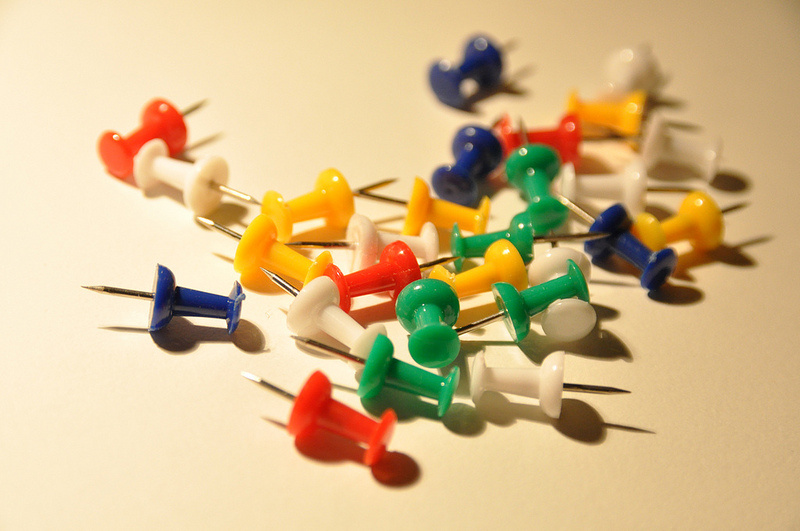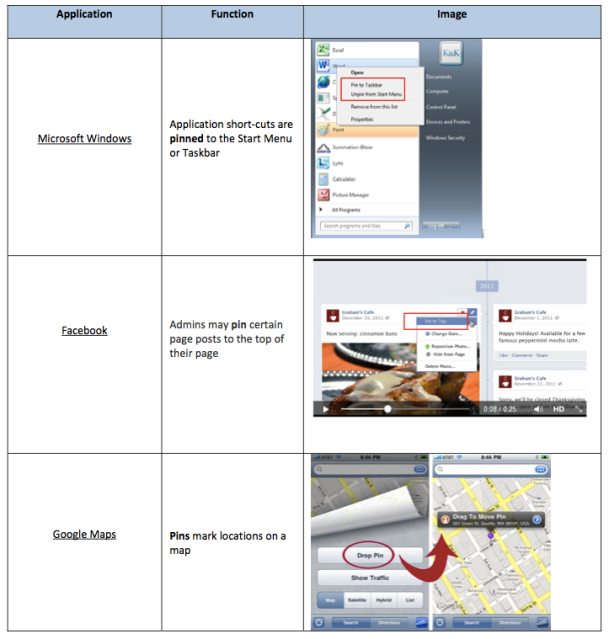

Pins, pins everywhere! Back in October, we reported on a trademark infringement suit filed by Pinterest against planning travel startup Pintrips, accusing it of trademark infringement, false designation of origin, unfair competition and trademark dilution. Now Pintrips is fighting back. It has filed a motion to dismiss on two grounds: first, that the term “pin” is too generic; and second, that Pinterest has made a claim on insufficient grounds as a result.
These are the pin buttons in question, from a picture in Pinterest’s original suit:

Pintrips’ motion for dismissal, filed in the U.S. District Court for the Northern District of California, is embedded below.
The development comes at a time when Pinterest is facing another setback on the trademark front. Last month, a court in Europe determined that it does not own the trademark on the word “Pinterest” — a London-based startup called Premium Interest does. A spokesperson for Pinterest tells us that it will be appealing the case.
In the Pintrips case, the startup is fighting back with a vengeance, David versus Goliath style.
Pintrips — significantly smaller than the heavily venture-backed Pinterest that is now valued at nearly $4 billion – accuses it of preying upon a “hard-working startup” that is not in the same social media space; and of taking legal actions because of its failure to secure trademarks on generic words. From the suit:
“Frustrated by its failure to secure a U.S. trademark registration for the term ‘pin,’ and knowing that it cannot assert trademark rights for the term ‘pin,’ Plaintiff has resorted to suing Pintrips, Inc. (‘Pintrips’), a hard-working start up, on specious claims. Pintrips is not a social media platform. It is an online travel planning tool that allows users to review and monitor information for commercial flights…Part of Pintrips’ functionality [as we have written about before] is based on allowing users to virtually pin flights while planning travel arrangements. This Complaint is a textbook example of an industry giant using a spurious lawsuit to bully a small entity into giving up its right to use a generic, common term that merely describes a core function of its service.”
Pinterest, however, appears to be directly refuting a core part of this claim about the registration of the word “pin.” It notes that it has already had its application approved (but not yet registered):
“Our focus is on preventing consumer confusion and protecting our trademarks,” a spokesperson tells me. “Toward that goal, Pinterest already has registered trademarks for PIN in several countries, and the U.S. Patent and Trademark office has approved Pinterest’s application for that mark, acknowledging the protectability of PIN in favor of Pinterest.”
Pintrips raises a number of other points that it believes argues against the ability for Pinterest to claim any ownership of the word “pin.”
For starters, there are already a number of other, much bigger online services that already use the word freely and without legal heat from Pinterest. They include Microsoft, Google and Facebook:

Pintrips’ lawyers note that removing “a common generic term” like “pin” from “common and pervasive use so that a single company may profit” is against the law. But even so, there are a number of companies already with trademarks granted that include the word “pin,” again implying that these already coexist with Pinterest. Those companies include Pinny, Pinwheel, Pinning Party (my favorite) and Pinsync.
And AOL (parent company of TC) even makes an appearance in the motion in another section, where Pintrips’ lawyers attempt to demonstrate from other examples that words that sound too generic have failed to get trademarked in the past. For AOL, its Achilles’ heel was “You have mail.”
“Ordinary, everyday expressions are repeatedly denied trademark status because they are informational phrases rather than indicators of source, and thus such expressions remain free for all to use,” Pintrips’ lawyers write.
Part of Pinterest’s appeal to users is its accessibility, which is helped by being built around non-technical and non-virtual concepts like pinboards and pins. Pinterest, now with $338 million in funding, has an enormous amount of resources now to try to protect its brand from those who will try to copycat its concepts and success. The question now is whether it’s choosing the right battles to fight and whether a Pintrips (or in the case of Europe, Premium Interest) may ever really impede the progress of its business.
Image: Flickr
Read more : Pintrips Files A Motion To Dismiss Pinterest’s Trademark Suit, Says ‘Pin’ Is Too Generic


0 Responses
Stay in touch with the conversation, subscribe to the RSS feed for comments on this post.